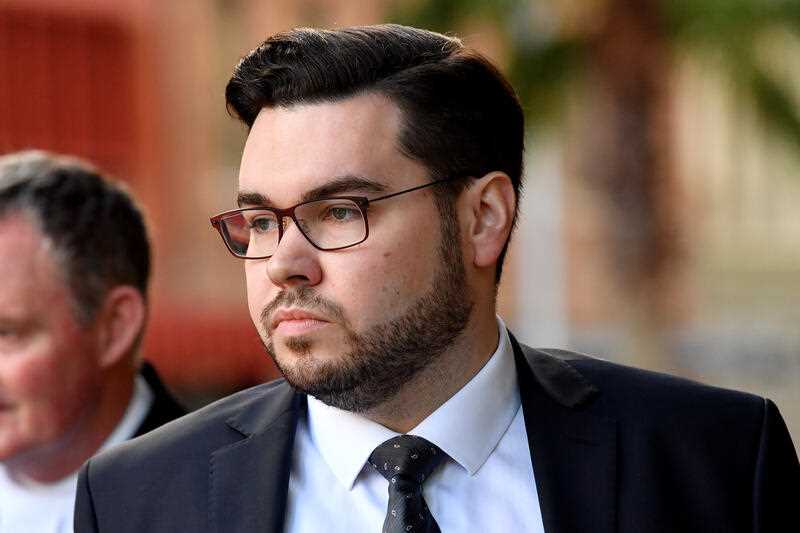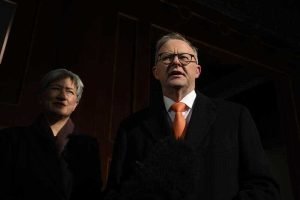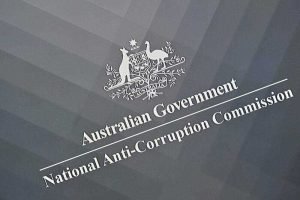The Shot
Did the Morrison Government cover up an alleged in-house rape?

Did the Morrison Government try and cover up the rape of a 24-year-old staffer? Or did key players in Reynolds and Morrison’s offices simply hope like hell the whole thing would go away, offering minimal support to a vulnerable victim while being too quick to move on to the political priority of a looming Federal election, leaving the young staffer with nowhere to turn as she struggled desperately with the after-effects of a life-changing assault?
In Week 4 of Bruce Lehrmann’s defamation trial, attention shifted to what Justice Lee referred to as the “obstruction allegation”, namely that the offices of Linda Reynolds and the Prime Minister colluded to cover-up Brittany Higgins’ accusation of rape to avoid one hell of a distraction during a difficult election campaign. From our vantage position now apprised of the egregious behaviour of so many players, including Reynolds’ cameos as coach for the Defence in the criminal trial and co-star of Channel 7’s chequebook apologia, it’s easy to see why Brittany feels betrayed by the party she loved and served, and why she is so sceptical of the shrill assurances that she was offered nothing but support and agency in the days, weeks and years after the alleged rape. But was it tantamount to a cover-up? And was it reasonable for Channel 10 to report it as such?
From the start, Acting Chief of Staff Fiona Brown didn’t know how to handle the situation. Even disciplining staffers for an unauthorised late-night entry into Parliament House was outside anything she or her contact at the Department of Finance Lauren Barons had previously dealt with. Provided with a script by Barons to use when questioning the young staffers, it is clear Brown was woefully ill-equipped to handle the infinitely more serious allegations of a sexual assault in the workplace. She claims she drew no conclusions when Brittany says she “remembered (Bruce) on top of her,” despite giving her the number for a sexual assault hotline. She handed Brittany a pamphlet for the Employee Assistance Program and gave her the afternoon off. She sent a few texts to check in. Reynolds was on the road but Brown kept her boss up to date as information came to light. The Prime Minister’s Chief of Staff came over to be briefed. The Special Minister for State got involved. The AFP Commissioner opened a direct line with the Minister.
Ten days after the assault, Brown organised a meeting with Reynolds and Brittany in the very room in which Brittany alleged it occurred. After the meeting, she escorted Brittany down to the parliamentary police office deep in the bowels of Parliament House. She left Brittany at the elevator doors and never spoke to her about the rape again.
The meeting at the crime scene on April 1 was the first and only time Reynolds ever spoke directly to Brittany about the alleged rape. Reynolds expressed her sorrow that such a thing had happened and her incredulity that Lehrmann was capable of it, whilst phlegmatically noting that “these are things women go through,” an odd comment that caused Brittany to wonder, #HerToo? After that, Reynolds seemed to keep her distance.
Brown later denied Brittany had been offered anything but support if she chose to progress a police complaint and insisted she was given the option of seeing out her contract in Queensland. But the election was called the very next week, and the main game for Reynolds’ office was in Western Australia with staffers due to campaign in key electorates. If Brittany returned to Queensland instead of joining the fray, she would not be assigned to the Liberal Campaign Headquarters in Brisbane as she hoped, but to a spell of something akin to gardening leave in an electorate office. And with the Government expected to lose the May election and the majority of Ministerial staffers facing redundancy, Brittany understood that for someone who absconded during a vital campaign, a return to Canberra to one of the dramatically fewer roles in Opposition was unlikely. Nothing personal, just politics.
Brown needed a quick decision – Queensland or WA? Brittany felt pressure to go to WA. In her conversations with police and counsellors, her distress at what she described as the “conflict between her career and pursuing justice”, and “the replaceable nature of her employment” was clear. Rape Crisis Counsellor Catherine Cripps reported Brittany repeating “I want to report the rape but I want to keep my job”. It was a “terrible conflict, a real tug of war,” she said.
On April 13, Brittany wrote to Detective Senior Constable Sarah Harman to advise she had decided not to proceed with her complaint, a decision that felt right, “especially in light of (her) current workplace demands.” So she went to Perth, where she felt isolated and alone.
Reynolds’ then aide-de-camp Major Nikita Irvine, a reluctant witness in the proceedings who had been present at the Dock and in whom Brittany had confided about the rape, told the court how she’d sought to support Brittany at a time she seemed particularly down. But Brittany continued to struggle, and after the Coalition’s unexpected victory in May she resolved to start afresh and left Reynolds’ office to work for Michaelia Cash.
Would Brittany’s career really have been in jeopardy if she’d continued with her police complaint and prioritised her own recovery above being a team player? Or was the pressure self-inflicted?
Liberal women who did speak publicly about intra-party assaults found their career paths derailed. Eryk Bagshaw’s story in the Sydney Morning Herald on July 30, 2019 detailed the experiences of Dhanya Mani and Chelsea Potter when they’d sought justice within the Liberal Party after being assaulted by fellow staffers. With no formal processes for reporting harassment or assault, and offhand responses from the Liberal party figures to whom they’d disclosed their assaults, both felt pressure to stay silent. “If you decide to tell anyone else about this you are going to be slut shamed and your reputation will be ruined,” Mani says she was told by a leading Liberal woman. “I wasn’t prepared to stake my career or all my hard work” to take it forward, said Potter.
Kathryn Greiner described the Liberal approach to such matters as “management by benign neglect,” a not unreasonable description of the behaviour of Brown and Reynolds. From the beginning, they neither wanted nor knew how to deal with the allegations – they weren’t trained and they were busy, and pre-election stories of a rape in the office of the Minister for Defence Industry were never going to be great PR. Less than a week after the alleged rape, Barons confirmed to Brown she’d done everything she could and should and it was now over to Brittany to take action if desired. “I consider the steps you have taken to be appropriate,” Barons wrote in an email. Time to move on.
But Brittany couldn’t move on and it was Bagshaw’s story that became – in Whybrow’s parlance – “the acorn” from which Brittany’s thoughts of going public with her own story first grew. “Their stories were so similar to mine, the way they felt how they [had been] dealt with by the Liberal Party.” Although she “didn’t want to become the girl who got raped in Parliament House,” she believed the Liberal Party’s handling of sexual misconduct allegations had to change.
Her disquiet was reinforced by the 4 Corners broadcast of November 9, 2020, Inside the Canberra Bubble, that detailed the reprehensible sexist behaviour of senior Liberals towards female staffers and demonstrated the disposability of young women. Brittany got angry. She “couldn’t be silent anymore”.
“There were so many people and when it became clear it was a pattern, at that point I just couldn’t sit on it anymore,” she told the court.
Also watching 4 Corners that night, Yaron Finkelstein from the Prime Minister’s office understood the risk it posed, the potential for a strong response from those the party had failed. He called Brittany the next day to “check in.” His attempt at damage control proved ineffective. Inspired by the courage of women who had spoken out to force change, Brittany resolved to join their ranks. “I wanted things to get better,” she said later to Wilkinson. “I couldn’t live with myself if it happened to someone else.”
Perhaps too she hoped to make life a little more difficult for her alleged rapist who appeared to have suffered few consequences for his actions?
Brittany Higgins clearly articulated to the court her motivation for speaking publicly of her rape allegation and reviving her complaint two years after her reluctant stint in Perth. She described her evolving position from the acorn of the Herald article in July 2019 to her appearance on The Project in February 2021.
Steve Whybrow’s competing theory was less persuasive. Why would a young woman who had secured her “dream job” in the halls of power in Parliament House invent a scurrilous story of a rape that didn’t happen? Easy, asserted Whybrow. Observing her partner-in-crime from a late-night drunken foray into Parliament House emerge from a disciplinary meeting with their boss and summarily pack up his desk and leave, Brittany spontaneously created a dark tale of sexual assault to save herself from the same fate, painting herself as a rape victim to dodge responsibility for their unauthorised visit and her subsequent nude sleepover. And thereafter she was forced to maintain the lie. To make formal reports to multiple police officers containing myriad visceral details. To make emotionally charged disclosures to a growing circle of family, friends and colleagues. To demonstrate significant distress in counselling sessions with mental health professionals. The audacity and acting ability required of Brittany over years to maintain this lie were unparalleled.
Whybrow’s theory didn’t address why, after getting away with such a despicable lie and not just retaining her job but securing a new one in a Ministerial office in which she was very happy, Brittany decided to riskily double down and take her story to a national television audience, particularly given her priority until then had been keeping the story as secret as possible. “For the money,” proclaimed Whybrow, even though, unlike his client, Brittany was not paid for her television interview, and there was no book deal on the table when she first approached journalists, nor any settlement on offer from the Department of Finance. The settlement offer came much later, perhaps spurred by the churlish post-facto behaviour described to the court of the two Ministers who had latterly employed her.
Which of these stories seems more likely? On the balance of probability?
As is the sad norm with so many rape survivors, telling her story has come at great cost to Brittany Higgins. Telling it in the criminal court led to a suicide attempt. Telling it again in a civil court seemed at times too much for her to bear but, she said, “I would not let my rapist become a millionaire for being a rapist….(so) now I’m here.”
If Justice Lee accepts the Truth defence in Bruce Lehrmann’s defamation suit, namely that, on the balance of probability, Lehrmann raped Brittany Higgins on that fateful night, he won’t need to weigh the Qualified Privilege argument. Lehrmann falls at the first hurdle. If Justice Lee rejects the Truth defence, Channel 10 and Lisa Wilkinson must show there was a public interest in The Project broadcasting details of the sexual assault and cover-up allegations, and that their journalism was reasonable in the circumstances.
To that end, let us recall that The Project’s interview with Brittany led directly to the Set the Standard report by Kate Jenkins that revealed the cesspool of harassment and exploitation in which political staffers laboured and developed an entirely new framework for their employment.
Next time something untoward happens in a parliamentary office, there is an independent professional body to deal with the fallout, the Parliamentary Workplace Support Service. The interview also led to the hasty dusting off and implementation of the 55 recommendations of Jenkins’ Respect@Work Report, a report that had previously languished in a dusty drawer in Christian Porter’s office, and which included the groundbreaking positive duty of employers to prevent sexual harassment and not just deal effectively with its aftermath.
After all she has endured, Brittany may wonder if it was in her interests to embark on the path that she did, but the outcomes were definitely in ours. Her story – consistent, detailed and harrowing as it has been – transformed the country.
More like this
Dave Milner






